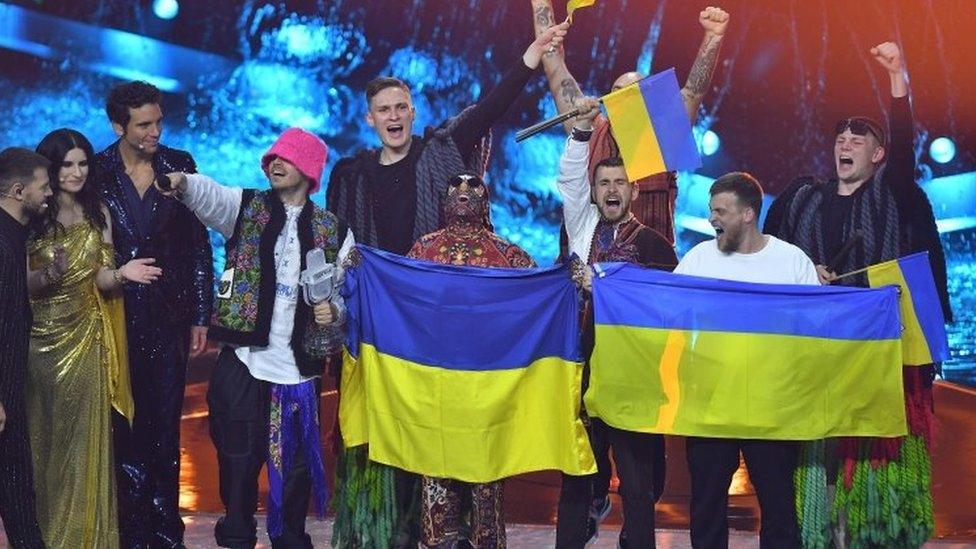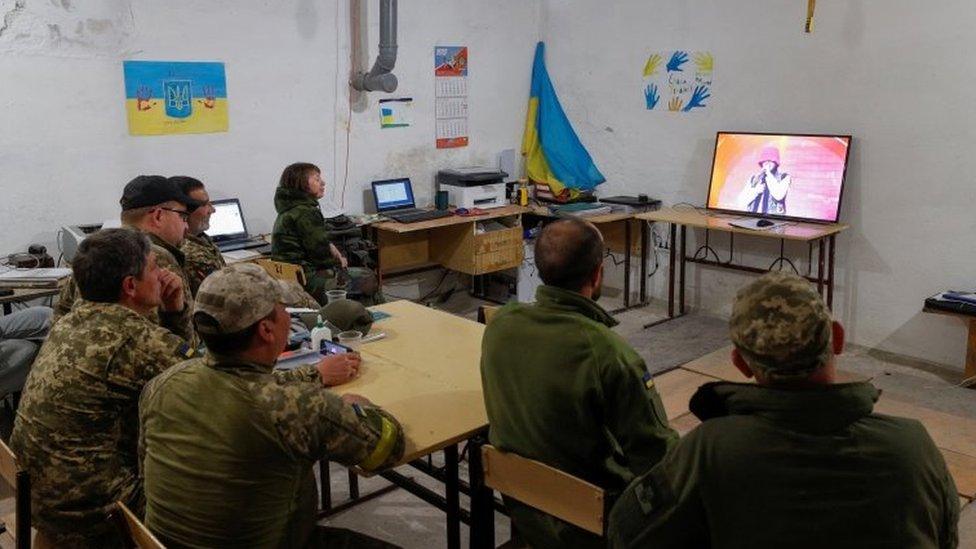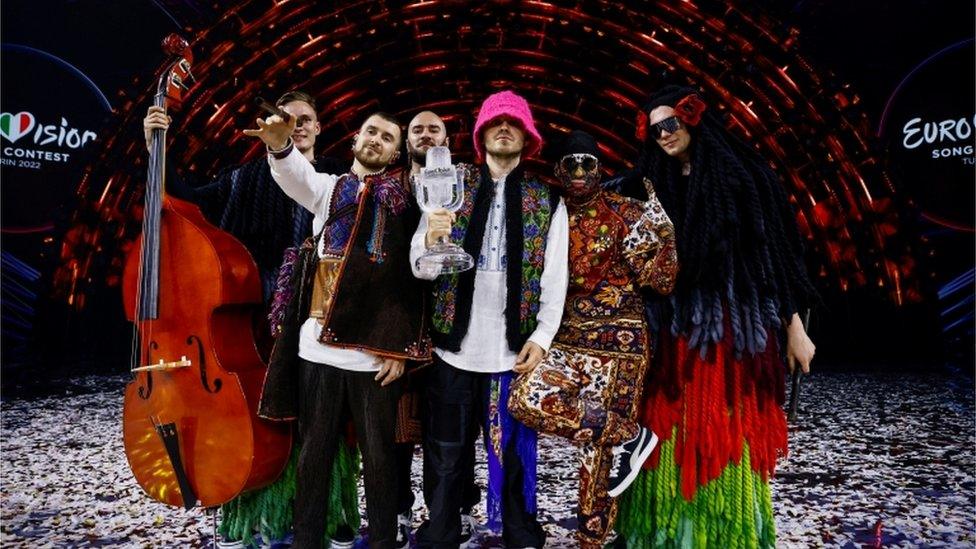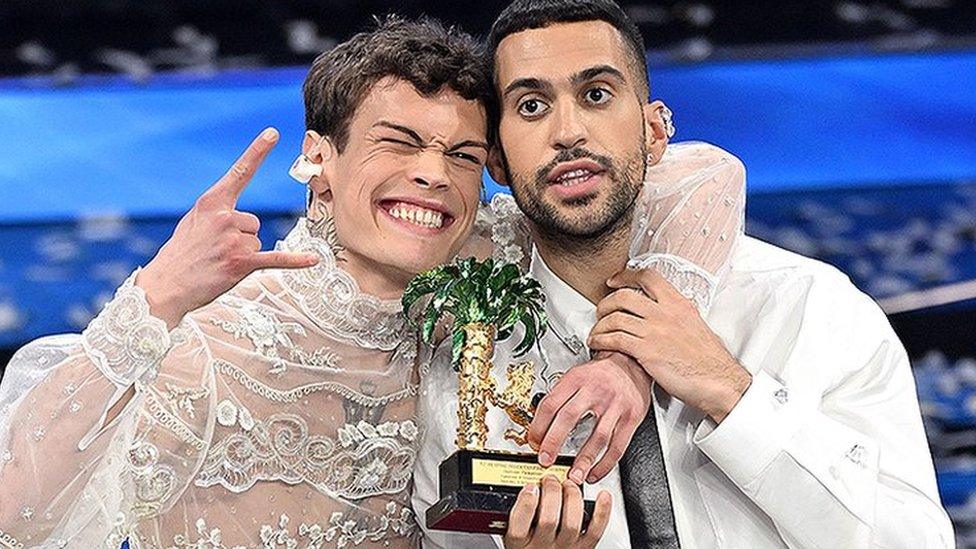Eurovision win brings 'incredible happiness' to Ukraine
- Published

Ukrainians are celebrating winning this year's Eurovision amid the Russian invasion
"When they said that we had won, I shouted at the whole apartment," said Ivanna Khvalyboga, who was forced to flee Ukraine following the invasion.
Speaking from Poland, she told the BBC the win meant "incredible happiness for Ukraine and Ukrainian people".
Kalush Orchestra won the competition, beating the UK and Spain to clinch the top spot.
The group had been predicted to take the title as support rose following Russia's invasion.
Ukrainian President Volodymyr Zelensky congratulated Kalush Orchestra and said Ukraine's courage "impresses the world".
In a post on Instagram, he vowed one day to host Eurovision in a "free, peaceful and rebuilt" Mariupol, referencing the port city that is mostly under Russian control.
Kalush Orchestra talked about Mariupol and the Azovstal steelworks at the end of their performance, a move praised by people online.
"I'm sure many people will search the internet for information about Mariupol and Azovstal and it's great," one person wrote on the messaging service Telegram. "We need attention, a lot of attention."

Ukrainians had been on tenterhooks throughout the ceremony
Yura Solodzhuk, the administrator of a Ukrainian Eurovision fan page, who was forced to flee his country, told the BBC he was shocked at the win but said it would "help attract the world's attention again".
"It's important to remind the world about us again and again, that Ukrainian music and culture exists," he said.
The group's song Stefania was written as a tribute to lead singer Oleh Psiuk's mother, but its emotive lyrics have been interpreted as a rallying cry and tribute to the nation.
"Stefania is heard every day on the front line of our fighters as a call for freedom," Ann Fedirko told the BBC from Ukraine. "Every soldier remembers his mother, who prays for him at night and he has to win a free life for her."
"This song is like our blood, which is now on the lips of every Ukrainian," she added.
Ukraine stormed into the lead following huge public support
Celebrations are mainly muted with people unable to celebrate in public places due to curfews in place across the country. Many people watched the contest from home.
In one flat in Kyiv where seven friends gathered for their annual Eurovision watch party, emotions ran high.
After a nail-biting wait for results, the friends rejoiced and hugged while waving Ukrainian flags and spraying a bottle of prosecco.
"It is something that unites us with the whole Europe," said Denys. "For us it is very important to be a part of this. Especially this year."
No parties in a bar or a club are possible in Ukraine because of a curfew that's been in place since the Russian invasion in February. So the group of friends are staying locked in together until the early hours.

One group of friends celebrated Ukraine's victory whilst under curfew in Kyiv
"I feel happy, there was so much tension!" Alina, who is hosting the party, said. Her message to the viewers who chose Ukraine as the winner? "You voted for peace, for freedom and future."
"In Ukraine we have war and some say it's not a time to have fun," her friend Natalia explained. "But we need to have fun, we need to live and have understanding and feeling of life."
"Now we see support of the whole world and it feels great."
Now Ukraine have won, there will need to be a discussion about where next year's Eurovision event could be hosted.
The winner usually hosts the show the following year, but depending on the situation in Ukraine, the European Broadcasting Union will have to come to a decision as to where it could be held.
But for now, Ukrainians are focused on what it feels like to be victorious and what it could symbolise for the future.
As refugee Ivanna Khvalyboga, who is currently in Poland, put it: "We have won Eurovision, we will win the war with Russia!"
Additional reporting by Hanna Chornous and Siobhan Leahy in Kyiv
Related topics
- Published15 May 2022

- Published9 May 2022
